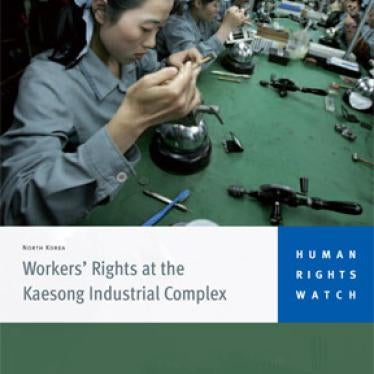Despite the deteriorating relations between North and South Korea since early last year, the Gaeseong Industrial Complex remained largely unchanged. North Korean workers continued to produce consumer goods for South Korean firms that in turn paid workers' wages to North Korea.
Meanwhile, South Korea quietly continued to ignore the lack of basic protection for human and workers' rights in the complex. Some concern would not have been misplaced, as shown by the arrest of a South Korean worker in late March for criticizing the North Korean political system, but now the entire future of the complex is in question.
On May 15 North Korea declared the terms of its agreement on the Gaeseong complex null and void. Pyongyang further said that if Seoul would not accept new terms, the Southern investors "should feel free" to leave the industrial zone. The South Korean government quickly denounced the announcement, expressing "deep regret" over North Korea's "unilateral decision."
The North Korean government has not elaborated on the exact changes it wants to the terms of the agreement, but from its comments in discussions earlier this month, it seems set on collecting higher fees for land use and higher taxes and workers' wages. Southern businesses say they currently pay about $100 per month for each northern worker in wages, insurance, transportation, food, and other work-related expenses.
North Korea's indignation would be more compelling if workers actually received the salaries themselves. Past research by Human Rights Watch has pointed out how North Korea demands that South Korean firms pay workers' wages directly to Pyongyang, despite the law governing the complex, which stipulates that South Korean companies shall pay wages to North Korean workers directly in cash. As a result, the workers receive only a small fraction of their wages. Even if wages were increased, it's not clear if North Korean workers would benefit from the raise.
South Korean media have been busy speculating about losses for each government and southern investors if the complex closes. Few seem interested in the plight of North Korean workers, who stand to lose their jobs, and who have no advocate for their rights or for a decent livelihood.
North Korea opened the Gaeseong Industrial Complex in June 2004 under a contract with the Hyundai Asan Corporation and South Korea-owned Korea Land Corporation. The law governing working conditions in the complex falls far short of international standards, especially with regard to the workers' right to elect their own representatives, form labor unions and bargain collectively. Also, protection from sex discrimination, sexual harassment and hazardous child labor is lacking.
Human Rights Watch has long called on both Koreas to amend the Gaeseong labor law to protect basic human and labor rights, but little has changed.
If South Korea believed that North Korea would honor the interest of Southern investors, or South Korean workers, while ignoring the rights of Northern workers, the recent arrest of the South Korean worker and the threat of evicting investors prove it wrong.
The worker - known by his last name, Yoo, and an employee of South Korea's Hyundai Asan - apparently faces charges of that include "defaming North Korea." Little is known about what triggered his arrest, since South Korean officials have been denied access to him.
South Korean investors are up in arms with the threat of the Gaeseong Industrial Complex closure. But South Korean businesses that have been passively but conveniently overlooking the rights of North Korean workers can't expect much sympathy. Once again, it's North Korean workers who pay the ultimate price of Pyongyang's greed.
Kay Seok is North Korea researcher at Human Rights Watch.







